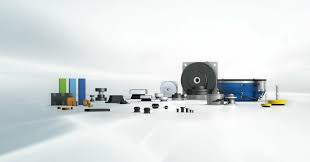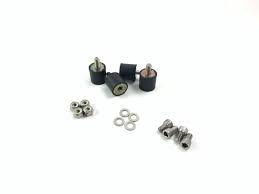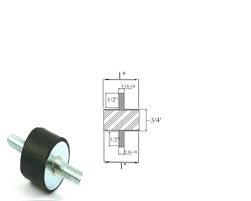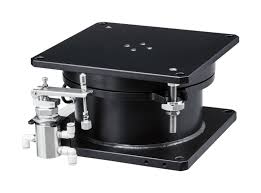Air conditioning vibration isolators are essential for keeping your air conditioning unit operating quietly and efficiently. Vibration isola...
Air conditioning vibration isolators are essential for keeping your air conditioning unit operating quietly and efficiently. Vibration isolators help to reduce the noise and vibrations produced by the unit, ensuring a peaceful and comfortable environment in your home or office. In this article, we will explore seismic isolated building the importance of using vibration isolators for your air conditioning system and how they can help maintain a quiet and peaceful environment. Whether you are looking to upgrade your existing air conditioning unit or install a new one, vibration isolators are a crucial component for ensuring a quiet and peaceful atmosphere.
Keep Your Air Conditioning Quiet with Vibration Isolators Vibration isolators are essential for keeping your air conditioning unit running quietly and efficiently. These devices work by reducing the transmission of vibrations from the compressor to the surrounding structure, which can help prevent noisy operation and potential damage to the unit. By installing vibration isolators, you can significantly reduce the amount of noise produced by your air conditioning unit, creating a more comfortable and peaceful environment in your home or business. Additionally, these isolators can also help extend the lifespan of your air conditioning system by minimizing wear and tear caused by excessive vibration. There are different seismic isolators for buildings types of vibration isolators available, including rubber mounts, spring isolators, and neoprene pads. Each type has its own set of advantages and is suited for different applications, so it's important to choose the right isolator for your specific needs. Overall, investing in vibration isolators for your air conditioning unit is a simple and effective way to ensure quiet and reliable operation, providing you with the comfort and peace of mind you deserve.
Vibration isolators are devices that help minimize the transmission of vibrations from the air conditioning unit's compressor to the surrounding structure. This is crucial for reducing noise and preventing potential damage to the unit. By installing vibration isolators, you can effectively reduce the amount of noise produced by your air conditioning unit, creating a quieter and more comfortable environment for your home or business. These isolators can also help extend the lifespan of your air conditioning system by minimizing wear and tear caused by excessive vibration. There are various types of vibration isolators available, including rubber mounts, spring isolators, and neoprene pads. It's important to choose the right isolator for your specific needs and application. Ultimately, investing in vibration isolators for your air conditioning unit is a simple yet effective way to ensure quiet and reliable operation, providing you with the comfort and peace of mind seismic isolation bearings you deserve.
The Importance of Using Air Conditioning Vibration Isolators

Air conditioning vibration isolators are essential for maintaining the performance and longevity of HVAC systems. These isolators help to prevent the transmission of vibration and noise from the air conditioning unit to the surrounding building structure, reducing the potential for noise disturbances and structural damage. By effectively isolating the vibration, these components also contribute to improved indoor air quality and occupant comfort. Additionally, vibration isolators play a crucial role in minimizing wear and tear on HVAC equipment, ultimately extending the lifespan of the system and reducing maintenance costs. Overall, the use of air conditioning vibration isolators is critical for ensuring smooth, reliable, and efficient operation of air conditioning systems.
How Air Conditioning Vibration Isolators Can Reduce Noise and Maintenance Costs

Air conditioning vibration isolators can reduce noise and maintenance costs by effectively isolating the compressor unit from the surrounding structure. This can prevent vibration from being transmitted into the building, which in turn reduces noise levels. Additionally, by reducing the amount of vibration, the wear and tear on the air conditioning unit and surrounding equipment is minimized, leading to lower maintenance costs over time. Isolators also help to extend the lifespan of the equipment by preventing excessive vibration-related damage. This can result in cost savings for the building owner or manager in the long run.
Selecting the Right Air Conditioning Vibration Isolators for Your HVAC System

When selecting the right air conditioning vibration isolators for your HVAC system, it's important to consider factors such as the size and weight of the equipment, the level of vibration it produces, and the space available for installation. It's also crucial to choose isolators that are compatible with the specific type of HVAC equipment you have. Additionally, you should take into account the environmental conditions and any regulations or standards that may apply. Properly selecting and installing vibration isolators can help to extend the life of your HVAC system and minimize noise and vibration transmission. Consulting with a professional HVAC technician can also ensure that you choose the most suitable isolators for your specific needs.
Benefits of Installing Air Conditioning Vibration Isolators in Commercial Buildings

Noise Reduction: Air conditioning vibration isolators can help reduce the vibration and noise produced by HVAC systems, creating a more comfortable and productive work environment for occupants of commercial buildings. Extended Equipment Life: By reducing the amount of vibration transferred to the HVAC equipment, vibration isolators can help prolong the lifespan of the equipment, saving on maintenance and replacement costs. Protection of Building Structure: Excessive vibration from HVAC systems can cause damage to the building's structure over time. Vibration isolators can help mitigate this risk, protecting the integrity of the building. Improved Energy Efficiency: Well-installed vibration isolators can help improve the energy efficiency of HVAC systems by reducing the strain on the equipment, resulting in lower energy consumption and cost savings. Compliance with Regulations: Some commercial buildings may be subject to regulations and guidelines regarding vibration and noise levels. Installing vibration isolators can help ensure compliance with these requirements. Overall, the installation of air conditioning vibration isolators in commercial buildings can provide numerous benefits, including improved comfort, cost savings, and compliance with regulations.
Common Signs That Your Air Conditioning Vibration Isolators Need Replacement
vibration dampening mounts
- Increased noise: If you notice an increase in noise coming from your air conditioning unit, it could be a sign that the vibration isolators are worn out and need replacement. Worn isolators can lead to more vibration and movement of the unit, resulting in louder operation. - Excessive vibration: If your air conditioning unit is vibrating more than usual, it may be a sign that the vibration isolators are no longer effectively dampening the movement. Excessive vibration can cause damage to the unit and other components in the surrounding area. - Uneven unit operation: If you notice that your air conditioning unit is not operating as smoothly as it used to, it could be due to worn vibration isolators. As the isolators wear out, they may no longer provide the necessary support for the unit, leading to uneven operation. - Visible wear and tear: Inspect the vibration isolators for any signs of wear and tear, such as cracks, tears, or deformation. These visual cues can indicate that the isolators are no longer able to effectively absorb the vibrations from the air conditioning unit. - Reduced energy efficiency: Worn vibration isolators can lead to increased energy consumption as the unit works harder to compensate for the lack of proper support. If you notice a sudden spike in your energy bills without a corresponding increase in usage, it may be time to replace the isolators.
The Role of Air Conditioning Vibration Isolators in Preventing Structural Damage
Air conditioning vibration isolators are crucial in preventing structural damage caused by the vibration and noise of HVAC systems. These isolators are designed to absorb and minimize the vibration and noise generated by air conditioning units, preventing it from transferring to the building structure. By reducing the transmission of vibration, air conditioning vibration isolators help to protect the building's structural integrity, preventing damage to walls, floors, and ceilings. This is especially important in high-rise buildings, where the cumulative effect of multiple air conditioning units can lead to significant structural damage over time. Without proper vibration isolation, the constant vibration and noise from HVAC systems can lead to cracks, weakened building materials, and other structural issues. In addition to protecting the building structure, air conditioning vibration isolators also contribute to a more comfortable indoor environment by reducing noise and vibration levels. This can lead to improved occupant satisfaction and overall building performance. Overall, the role of air conditioning vibration isolators in preventing structural damage is essential for maintaining the integrity and longevity of buildings, particularly in urban environments with high-density HVAC systems. Properly designed and installed vibration isolators are a critical component of any building's HVAC system, helping to minimize the impact of air conditioning units on the surrounding structure.
Understanding the Different Types of Air Conditioning Vibration Isolators
Air conditioning vibration isolators are essential components for reducing the transmission of noise and vibration from air conditioning equipment to the surrounding building structure. There are several different types of vibration isolators, including elastomeric isolators, spring isolators, neoprene mounts, and hanger isolators. Each type of isolator is designed to address specific vibration and noise transmission issues, and it is important to select the appropriate type based on the specific requirements of the air conditioning system and the surrounding building structure. Additionally, proper maintenance and regular inspection of vibration isolators are crucial for ensuring their effectiveness in minimizing noise and vibration transmission.
Tips for Proper Maintenance and Inspection of Air Conditioning Vibration Isolators
vibration isolators hvac
To properly maintain and inspect air conditioning vibration isolators, it is important to regularly check for any signs of wear or damage. This includes ensuring that the isolators are securely in place and not loose or deteriorating. It is also important to regularly clean the isolators to remove any build-up of debris or corrosion that may affect their performance. Additionally, it is recommended to have a professional technician inspect the isolators on a regular basis to ensure they are functioning properly and to address any potential issues before they become major problems. Regular maintenance and inspection of air conditioning vibration isolators can help prolong the lifespan of the equipment and prevent costly repairs or replacements.
In conclusion, it is important to keep your air conditioning unit quiet with vibration isolators to maintain a peaceful and comfortable home environment. By using air conditioning vibration isolators, you can reduce the noise and vibrations produced by the unit, ensuring a more enjoyable living space for you and your family. So, be sure to invest in quality vibration isolators to keep your air conditioning system running smoothly and quietly.
See also
https://www.vibrasystems.com/ https://www.sorbothane.com/vibration-isolation.aspx
